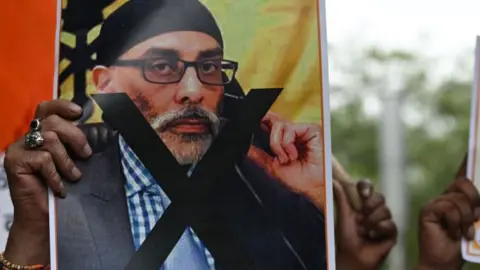US thwarts plot to kill Sikh separatist on American soil - report
 Getty Images
Getty ImagesThe US has raised an alleged plot to kill a Sikh separatist on American soil at the "senior-most" levels with India, the White House says.
According to the Financial Times, the target was Gurpatwant Singh Pannun, a US-Canada dual national.
Mr Pannun is a vocal advocate for an independent Sikh homeland and has been designated a terrorist by India.
The report comes weeks after Canada said India may have been behind the murder of another Sikh separatist.
The Financial Times reported on Wednesday, citing unnamed sources, that US authorities thwarted a conspiracy to kill Mr Pannun and have issued a warning to India over concerns it was involved in the plot.
The White House said Indian officials "expressed surprise and concern" when approached by the US about the allegations.
"They stated that activity of this nature was not in their policy," spokesperson Adrienne Watson said in a statement.
"We understand the Indian government is further investigating this issue and will have more to say about it in the coming days."
Ms Watson added that the US has "conveyed our expectations that anyone deemed responsible should be held accountable".
It is unclear whether the US protest to India resulted in the operation being called off, or whether it was disrupted by US authorities, the Financial Times reported.
Mr Pannun is the general counsel for Sikhs for Justice, an organisation based in the US that supports the broader Khalistan movement, which calls for an independent homeland for Sikhs in India.
In a statement to the BBC, Mr Pannun called the "foiled attempt" on his life "transnational terrorism which is a threat to the US sovereignty". "I will let the U.S. government respond to this threat," he said.
The Khalistan movement was at its peak in the 1980s in the Indian state of Punjab but it has lost steam over time. Politics in modern Punjab has shifted away from the movement and it is no longer a majority position.
But supporters in the Sikh diaspora have continued to advocate for a separate state, with calls for independence intensifying in recent years.
On Wednesday, India's Ministry of External Affairs said that the US had "shared some inputs pertaining to the nexus between organised criminals, gun runners, terrorists and others".
"India takes such inputs seriously since it impinges on our own national security interests as well," spokesperson Arindam Bagchi said in a statement.
The statement made no mention of Mr Pannun.
The Sikhs for Justice group was labelled an "unlawful association" by Indian authorities in 2019, and Mr Pannun was listed as an "individual terrorist" the following year.
Mr Pannun most recently angered Indian officials with a video warning Sikhs not to fly on Air India on a day earlier this month because it could be "life threatening".
India's National Investigation Agency filed a case against him for those remarks this week. Mr Pannun has since said that he was referring to a boycott of the airline and not making a threat.
US officials reportedly shared details of the alleged plot to kill Mr Pannun with some of its allies after Canadian Prime Minister Justin Trudeau said in September the country was investigating "credible allegations" that Indian agents may have been involved in the death of Sikh separatist Hardeep Singh Nijjar.
The 45-year-old was shot and killed by two gunmen outside a Sikh temple in a Vancouver suburb on a June summer evening this year.
India has repeatedly denied any involvement in the murder. Canadian authorities are still investigating his death.
Relations between Canada and India deteriorated sharply after Mr Trudeau's allegation, with both countries expelling envoys in a tit-for-tat diplomatic row.
Canada has not publicly shared the evidence or intelligence that led it to believe India was involved.
